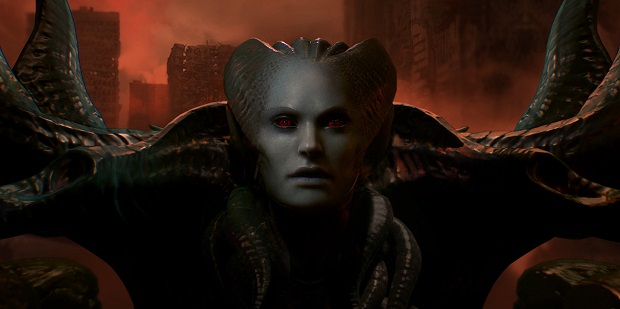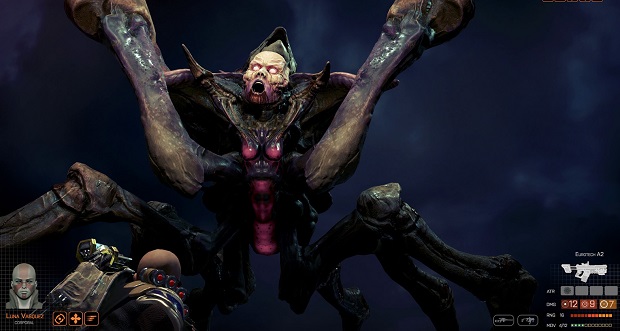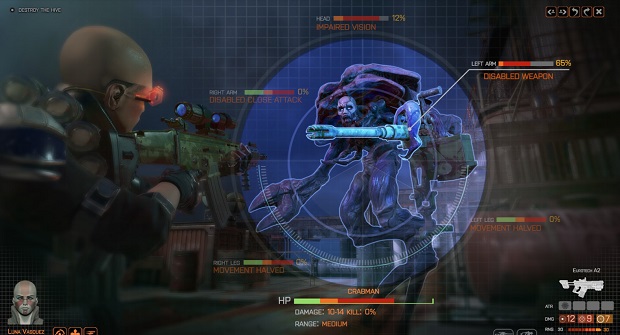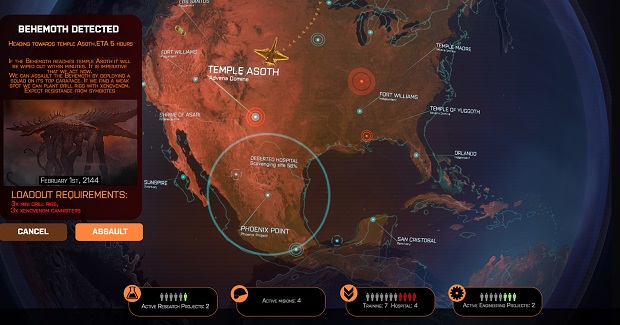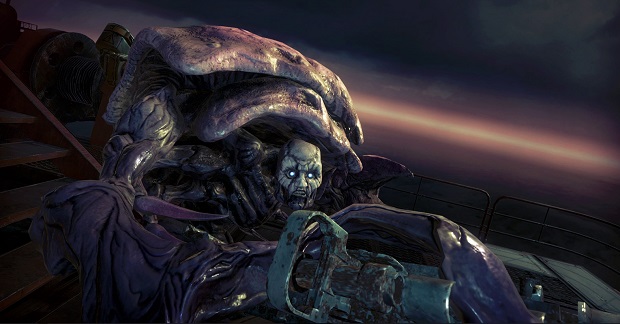Phoenix Point is now crowdfunding: we spoke to Julian Gollop about standing out in a post-XCOM world
Adam Smith on April 25th, 2017 at 5:00 pm.
The original X-COM (UFO: Enemy Unknown), Julian Gollop tells me, “succeeded in spite of itself”. I asked him how he felt about the game now, twenty three years after its initial release, and particularly about the way it’s often placed on a pedestal. He didn’t expect it to be a success and certainly didn’t think he’d be making a game heavily based on its legacy almost a quarter of a century later.
Yet here we are.
The crowdfunding campaign for
Phoenix Point [
official site], a sci-fi horror strategy game about an alien onslaught, has just begun. Gollop is back where many people feel he belongs, and this time round he seems extremely confident in his game’s design.
That confidence is sure to take some hits over the next year and a half – such is the reality of building a game. Phoenix Point isn’t slated for release until the end of 2018 and even though it’s been in development for a year already, the trickiest parts of the process are ahead.
You can read more about what the game is and what Gollop and his team hope it will become in this feature, which I wrote after seeing work in progress segments and speaking to Gollop at E3 last year. Here, I’m going to concentrate on the work that has already been done, and why I think it’s Gollop’s interest in simulation that will make Phoenix Point stand out in a post-Firaxis XCOM world.
I spoke to Gollop for an hour yesterday, talking about everything from how he built the team working on the game to his thoughts on new-XCOM, and XCOM-like games in the past. We also talked about crowdfunding, of course, and why he’s chosen to go that route again, after the successful Kickstarter for his new studio’s first game Chaos Reborn.
“It’s very tiring, running the campaign and looking at all the feedback, but I enjoy building a community and having those conversations. With Chaos Reborn, we had quite a big divide between people who wanted something like the very traditional Chaos game, and people who wanted something new. With Phoenix Point, I think there will be less of a divide in that sense. We’ve already done a survey, asking people what is important to them and it matches up with our own feelings very well.”
One of the big questions on that survey related to multiplayer. I can see the appeal of controlling mutated lifeforms in tactical combat scenarios, but I’d much rather have all of the time and resources spent on the game be put into the singleplayer campaign, with its emergent scenarios and dynamic AI factions. Gollop felt the same and was relieved to see the survey results agreed. Very few respondents felt that multiplayer was important.
Only people who have already signed up to the game’s newsletter ever saw the survey, so the sample size is relatively small and made up of people who are most likely familiar with Gollop’s previous work. That’s why I raised the question about UFO: Enemy Unknown’s status in its creator’s mind. It’s one of my favourite games but I rarely recommend it to people who’ve never played it before. I don’t think it’s aged particularly well and if I take off the rose-tinted glasses, I can see all kinds of things that I’d happily see changed or improved.
“There’s no tutorial, the interface has too many buttons…people don’t want to read a big manual before they play a game anymore.
I don’t like games where I have to read a manual!”
Phoenix Point will be a complex game, with lots of moving parts to keep track of, but it shouldn’t be overwhelming or obscure, and should avoid too many dead-ends.
“It’s a strategy game so eventually players are going to have to make some smart decisions if they want to survive, but we give people enough options that they shouldn’t be backed into a corner. If you need resources, you can raid another faction, or trade with them, or do a smaller, simpler mission to get hold of what you need. The aliens do have an objective they’re working toward, which I won’t reveal, but you’re not locked into an escalating military conflict. There should always be interesting decisions to make even if you’re not doing particularly well.”
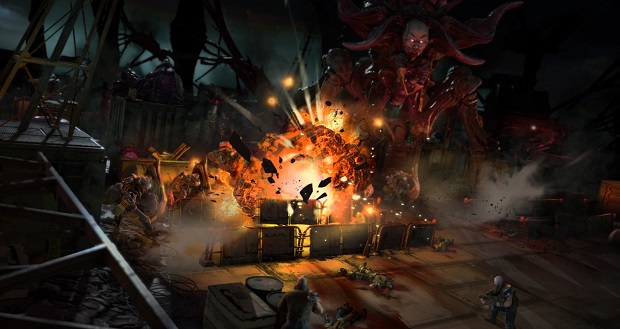
That’s all thanks to the dynamic world. Other human factions are playing the game, driven by AI, in the same way that you are. They have their own short- and long-term goals, and they need to perform missions of their own in order to achieve those goals.You can work with them or against them, and in the early game you’ll most likely be helping one another because the alien threat requires a team effort to counter, but you’re free to turn on them at any time. And they may turn on you, and will certainly retaliate if you work counter to their ambitions or directly assault them.
On that note, you can not only raid factions to steal resources, but can attempt to take over their bases (Havens) if you so choose. Giving the player so many options in a world full of simulated entities going about their own business is thoroughly exciting to me. The focus here is relatively narrow, with the aliens’ encroachment from sea to land taking precedence over convoluted diplomatic wrangling and dynasty-building, but there should be plenty of room to create alliances and enemies even in the endtimes.
“It’s a more complex Geoscape than in previous XCOM games because of that layer of simulation, but we’re not at the complexity of something like Civ.”
At this point, I should make it very clear that the image just above these words, of the Phoenix Point Geoscape, is one of the best things I’ve ever seen. I make no apologies for being an absolute nerd. Just look at it – weird temples devoted to cosmic horror, UI elements that look clear and useful, and a bloody great Behemoth. Missions will usually have some flavour to them beyond “go here to kill some aliens”, Gollop says, and I’m keen to see more of that sort of thing. I’m also pleased that he happily accepts my definition of Phoenix Point as a horror game.
“Oh, it absolutely is a sci-fi horror game. You can see the John Carpenter influence and The Mist is there as well as the cosmic horror elements. One of the most memorable aspects of X-COM was hearing shots and screams in the dark, seeing plasma fire but not knowing exactly where it’s coming from or what is waiting for you. The mist in this game is an extension of the fog of war, a manifestation of it, and it’s very dangerous. You have better tech than the aliens to begin with but the mist levels the playing field, as well as being a big part of the horror aspect.”
Gollop is a fan of the new XCOMs, going so far as to say Phoenix Point wouldn’t look or play as it does but for Firaxis’ games. One place where he feels there will be a very different flow, apart from the dynamic simulations themselves, is in the difficulty curve.
“XCOM games have traditionally started very difficult and become easier. The aliens have better tech than you but you turn the tables and eventually have very strong squads. In Phoenix Point, the aliens adapt to the way you play.”
This all goes back to the way the aliens are constructed. There are different cores, which Gollop calls “chassis”, and you’ll see different ones in different parts of the world. Africa has a chassis referred to as the Sphinx, which is based on a lion. But because these creatures are mutated mash-ups, that simply means it’s a tough, fast quadruped. It might have longer legs, borrowed from elsewhere in the animal kingdom, or human arms to hold a gun (and that gun will have been stolen from a human faction). If a gun-wielding sphinx manages to obliterate one or more of your squads, the aliens will stick with it, pleased with its efficiency. But if you find a new tactic or tech that takes out a whole bunch of them, the aliens will adapt.
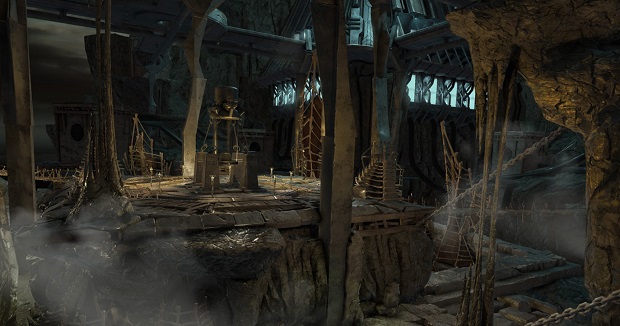
There’s a random element to those adaptations but essentially the alien AI is discarding parts that don’t seem to work and cycling in new elements to find a way to beat you. What this should mean is that the difficulty curve has peaks and valleys rather than a steady trend in either direction. There is a doomsday clock element behind everything, giving urgency to your actions, but Gollop wants to encourage experimentation rather than having people try to discover the ‘correct’ route.
And that, I think, is the major difference between Phoenix Point and other XCOMs and XCOM-likes past and present. It’s intended to be a game in which systems interact, overlap and allow players to observe them and react to them, while encountering factions and entities that make up and are reacting to those same systems. In that way, it has much in common with my beloved but flawed X-COM: Apocalypse and I can’t help but see it as a continuation of some of the ideas in that game. It’s about time.
The most enticing loose thread I find to pull on involves a game that never saw the light of day. As we talk about the long wait for more XCOM-like games, Gollop tells me about a project he pitched at MicroProse immediately after UFO: Enemy Unknown.
“It was set in the 1930s and you controlled a team of occult investigators. Portals were being opened bringing paranormal entities in the world, and you had to fight all kinds of different supernatural creatures. And Nazis.”
The Bureau for Paranormal Research and Defense: Enemy Unknown? Maybe once this next alien threat has been repelled.





























